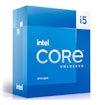Hi
Hoping to benefit from some of your combined wisdom. Currently have a M1 Mac Mini which I used as a seedbox. I have 3 x 16Tb drives in R0 and 1TB m.2 which I used a temp download location for torrents and Usenet.
I’ve went Intel for HW transcoding and I chose latest gen because I figured that would offer the best codec support?
My basket at OcUK:
Hoping to benefit from some of your combined wisdom. Currently have a M1 Mac Mini which I used as a seedbox. I have 3 x 16Tb drives in R0 and 1TB m.2 which I used a temp download location for torrents and Usenet.
I’ve went Intel for HW transcoding and I chose latest gen because I figured that would offer the best codec support?
My basket at OcUK:
- 1 x Intel Core i5-13600K (Raptor Lake) Socket LGA1700 Processor - Retail (SKU: CP-6AV-IN) = £338.99
- 1 x Lexar Hades 16GB (2x8GB) DDR4 PC4-28800C18 3600MHz Dual/Quad Channel Kit (SKU: MY-019-LE) = £39.95
- 1 x Corsair CV Series CV650 80 Plus Bronze ATX Power Supply (CP-9020236-UK) (SKU: CA-26E-CS) = £69.94
- 1 x Gigabyte B760M DS3H DDR4 (LGA 1700) DDR4 Micro-ATX Motherboard (SKU: MB-5C0-GI) = £114.99
- 1 x Jonsbo C3 Plus-Black/window Micro ATX Case (SKU: CA-007-JB) = £61.99
Total: £637.85 (includes delivery: £11.99)









